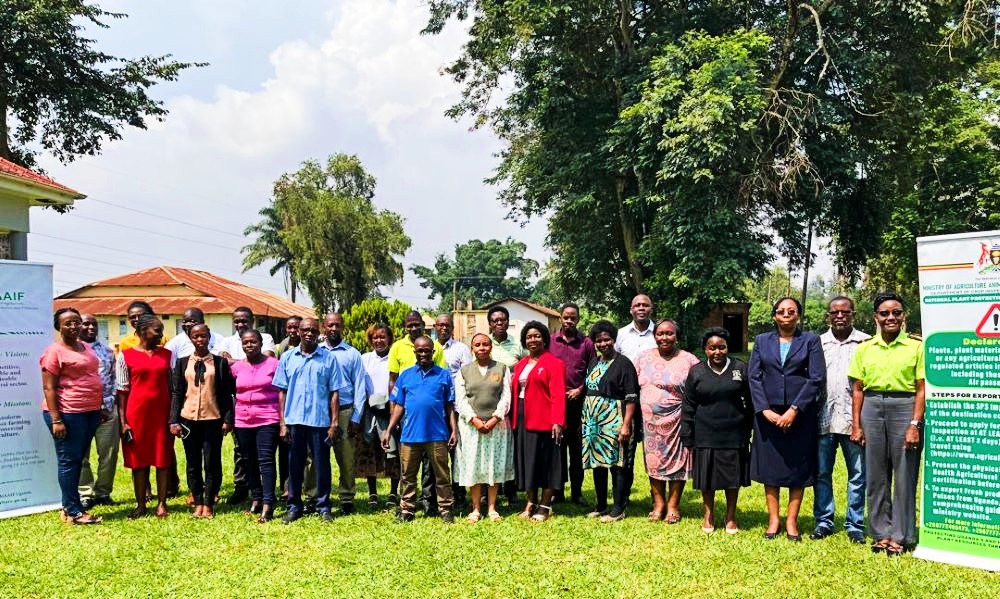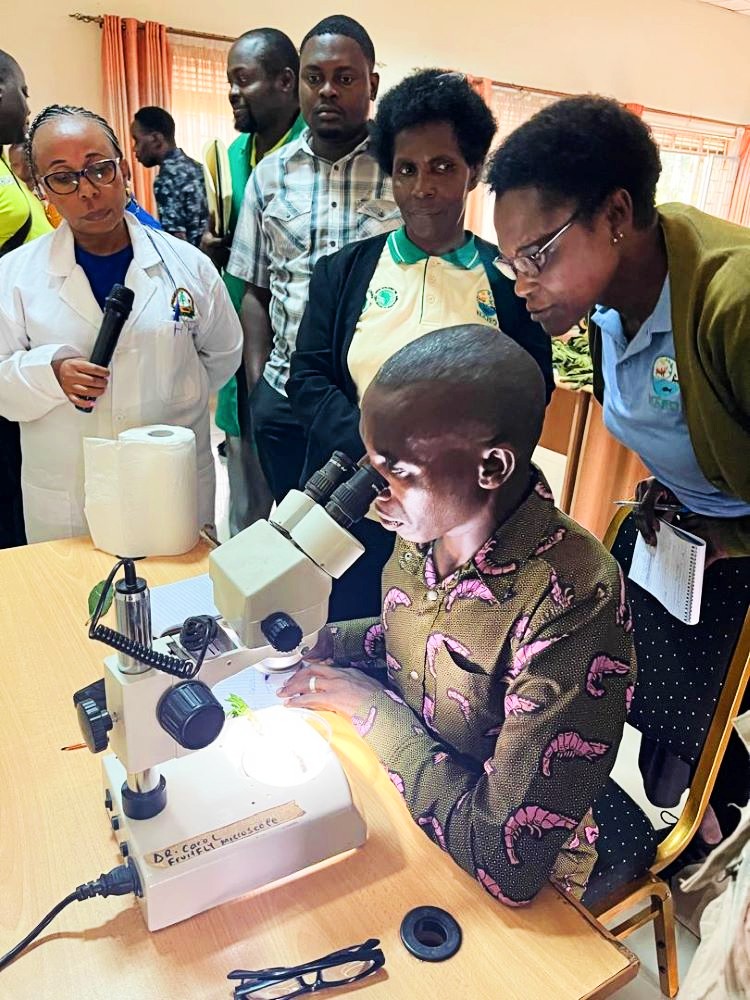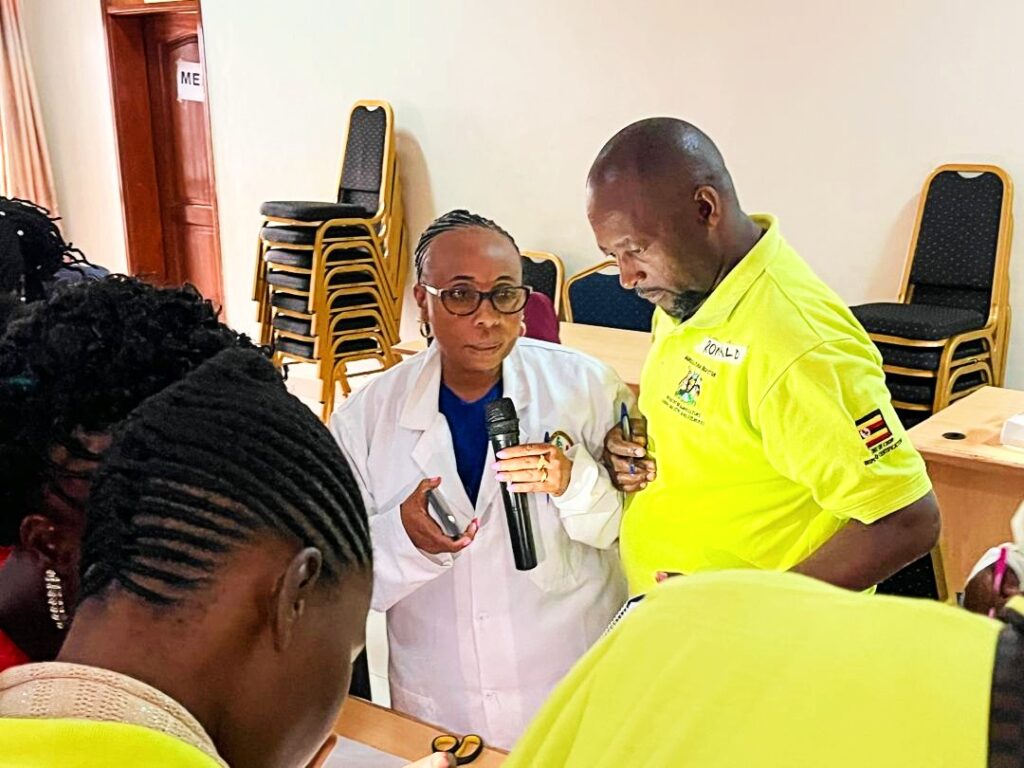
CABI, in partnership with the Kenya Plant Health Inspectorate Service (KEPHIS), have a four-day training package to equip parataxonomists from Uganda and Burundi. The training objective was to help them better understand scale insect diagnostics and management.
The training, received by 36 officers from National Plant Protection Organisations (NPPO) and Agricultural Extension and Research bodies of Uganda and Burundi, is part of the CABI-led project ‘Managing scale insects in fresh fruits in East Africa to enhance market access.’
It is funded by the Standards and Trade Development Facility (STDF) and includes a range of partners including the Ministry of Agriculture Animal Industry and Fisheries Uganda (MAAIF), NPPO, and the Institute des Sciences Agronomiques du Burundi (ISABU).
More effectively control scale insects which are becoming a serious pest
It is expected that the training will build the capacity of officials in the two countries to more effectively control scale insects which are becoming a serious pest of key export fruits including avocado, mango, citrus, papaya and pineapple, and impeding trade.
Those officers that have received the training will now train other extension staff, agronomists and farmers in their respective countries on how to sustainably manage scale insects which have been known to cause devastating crop losses of up to 91 percent.
Scale insects, which include false yellow scale (Pseudaulacaspis cockerelli), snout scale (Fiorinia proboscidaria) and black parlatoria scale (Parlatoria ziziphin), specifically adult females, typically have soft bodies, sometimes no limbs, and may be concealed on the underside of plants meaning they often go unnoticed or are misdiagnosed as a disease. They attack by inserting their tiny, straw-like mouthparts into the bark, fruit, or leaves.

Need to come up with an integrated pest management strategy
Sylvia Nantongo Mutebi, Senior Agricultural Inspector – Pesticides, NPPO Uganda, said, “It was interesting and important to learn that the biology of the scale insects is unique; hence consideration of how to choose the recommended pesticide is crucial.
“The need is for the right active ingredient and applied at the right time. Uganda currently has not registered any product for controlling scale insects.
“There is a need to come up with an integrated pest management strategy for the value chain of the priority crops that is realistic and practical to the Ugandan context.”
She added that the Agricultural Chemicals Board of Uganda should register effective agricultural chemicals for scale insect control on crops including avocado, mangoes, citrus and pineapple.
Furthermore, Joyce Brenda Kisingiri, Senior Agricultural Inspector- Phytosanitary/ Export Regulation, Uganda, said that without timely detection and accurate diagnosis, it is difficult to manage scale insects due to their very small size.
This must be followed with laboratory identification
“Field diagnosis with the naked eye is not adequate. This must be followed with laboratory identification using mounting slides, staining and microscopic viewing of all body parts to lead you to the correct pest ID,” she said.

She added that due to the risk of human, animal and environmental health risks that may be caused due to excessive and wrong application of pesticides in the management of scales, just like any other plant pest, an integrated pest management strategy would be a wise approach to take.
Asiimewe Ronald, Senior Agricultural Inspector – Zonal, NPPO Uganda, said the identification of scale insects is a skill that requires a lot of time in the laboratory. It was also recognised that scale insect management using chemicals is challenging due the nature of their body covering.
China-Kenya trade barrier on the export of fresh avocado
In the market access negotiation for avocado exports from Kenya to China, scale insects such as Fix wax scale (Ceroplastes rusci), West Indian Red Scale (Selenaspidus articulates), Stellate scale (Ceroplastes stellifera) and Cockerell scale (Lopholeucaspis cockerelli) are listed as major quarantine pests and contributed to the China-Kenya trade barrier on the export of fresh avocado.
Regional pest risks to production and trade include scale insects that damage not only crops but also other plant hosts species.
Mango, avocado, papaya and citrus are among the top priority fruits for export trade in East Africa.
Additional information
Main image: Delegates of the four-day training held to help extension and research officers from Uganda and Burundi better understand scale insect diagnostics and management (Credit: CABI).
Project page
Find out more about how CABI is working with partners to increase compliance with sanitary and phytosanitary requirements through improved surveillance and management of scale insect pests in East Africa from the project page here.
Relevant story
